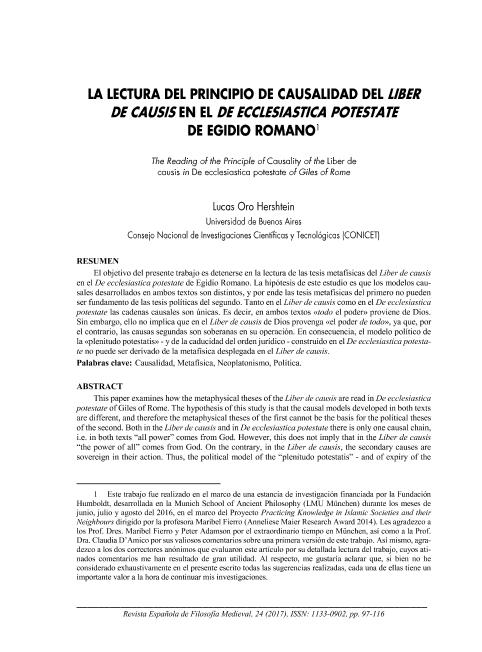Mostrar el registro sencillo del ítem
dc.contributor.author
Oro, Lucas

dc.date.available
2019-04-04T18:33:54Z
dc.date.issued
2017-11
dc.identifier.citation
Oro, Lucas; La lectura del Principio de Causalidad del Liber de causis en el de Ecclesiastica Potestate de Egidio Romano; Universidad de Córdoba; Revista Española de Filosofía Medieval; 24; 11-2017; 97-116
dc.identifier.issn
2530-7878
dc.identifier.uri
http://hdl.handle.net/11336/73177
dc.description.abstract
El objetivo del presente trabajo es detenerse en la lectura de las tesis metafísicas del Liber de causis en el De ecclesiastica potestate de Egidio Romano. La hipótesis de este estudio es que los modelos causales desarrollados en ambos textos son distintos, y por ende las tesis metafísicas del primero no pueden ser fundamento de las tesis políticas del segundo. Tanto en el Liber de causis como en el De ecclesiastica potestate las cadenas causales son únicas. Es decir, en ambos textos «todo el poder» proviene de Dios. Sin embargo, ello no implica que en el Liber de causis de Dios provenga «el poder de todo», ya que, por el contrario, las causas segundas son soberanas en su operación. En consecuencia, el modelo político de la «plenitudo potestatis» - y de la caducidad del orden jurídico - construido en el De ecclesiastica potestate no puede ser derivado de la metafísica desplegada en el Liber de causis.
dc.description.abstract
This paper examines how the metaphysical theses of the Liber de causis are read in De ecclesiastica potestate of Giles of Rome. The hypothesis of this study is that the causal models developed in both texts are different, and therefore the metaphysical theses of the first cannot be the basis for the political theses of the second. Both in the Liber de causis and in De ecclesiastica potestate there is only one causal chain, i.e. in both texts “all power” comes from God. However, this does not imply that in the Liber de causis “the power of all” comes from God. On the contrary, in the Liber de causis, the secondary causes are sovereign in their action. Thus, the political model of the “plenitudo potestatis” - and of expiry of the legal order - built in De ecclesiastica potestate cannot be derived from the metaphysics set out in the Liber de causis.
dc.format
application/pdf
dc.language.iso
spa
dc.publisher
Universidad de Córdoba
dc.rights
info:eu-repo/semantics/openAccess
dc.rights.uri
https://creativecommons.org/licenses/by-nc-sa/2.5/ar/
dc.subject
Egidio Romano
dc.subject
Liber de Causis
dc.subject
Causalidad
dc.subject
Filosofía Política
dc.subject.classification
Estudios Religiosos

dc.subject.classification
Filosofía, Ética y Religión

dc.subject.classification
HUMANIDADES

dc.title
La lectura del Principio de Causalidad del Liber de causis en el de Ecclesiastica Potestate de Egidio Romano
dc.title
The Reading of the Principle of Causality of the Liber de causis in De ecclesiastica potestate of Giles of Rome
dc.type
info:eu-repo/semantics/article
dc.type
info:ar-repo/semantics/artículo
dc.type
info:eu-repo/semantics/publishedVersion
dc.date.updated
2019-04-03T13:22:13Z
dc.identifier.eissn
1133-0902
dc.journal.number
24
dc.journal.pagination
97-116
dc.journal.pais
España

dc.journal.ciudad
Córdoba
dc.description.fil
Fil: Oro, Lucas. Consejo Nacional de Investigaciones Científicas y Técnicas; Argentina. Universidad de Buenos Aires. Facultad de Filosofía y Letras; Argentina
dc.journal.title
Revista Española de Filosofía Medieval
dc.relation.alternativeid
info:eu-repo/semantics/altIdentifier/url/http://www.uco.es/ucopress/ojs/index.php/refime/article/view/10454
dc.relation.alternativeid
info:eu-repo/semantics/altIdentifier/doi/http://dx.doi.org/10.21071/refime.v24i.10454
Archivos asociados
